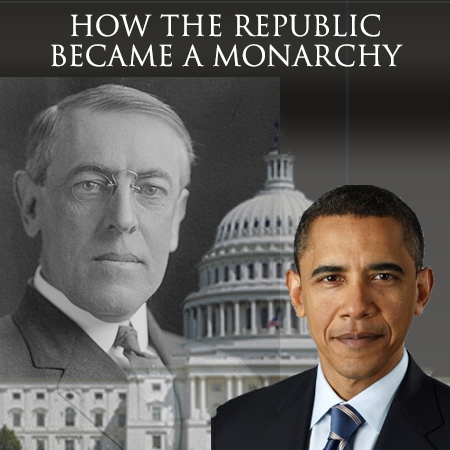President Barack Obama Meet President Dwight Eisenhower – How a 60-year-old slippery slope led into an ocean of illegal aliens
– 5 March 2014-
– by Peter B. Gemma, National Executive Committee member –
 |
Historians often speculate about “what ifs,” such as what if John Kennedy had lived, or what if Charles Dickens had dinner with Fyodor Dostoevsky, or what if the Confederacy had forced the North to the negotiating table. When thinking about “what happened to the American Dream,” it could be instructive to speculate about what if Presidents Dwight Eisenhower and Barack Obama had a discussion and debate on the issue of open borders — how and why they should be closed.
The two men served their country about 60 years apart, only a span of two generations, but they handled the problems caused by illegal aliens very differently in style and substance. |
The economy of 60 years ago is not what it is today. To keep the nation’s fiscal house in order — the country was downshifting from high gear in World War II arms spending, and faced a huge influx of returning veterans seeking jobs — President Eisenhower focused on creating a balanced federal budget. The government ran a small deficit in 1954 and 1955, then registered a surplus for each of the next two years. As the nation went into a recession in 1958 and 1959, Eisenhower allowed the federal deficit to grow because some of his advisors thought it would stimulate the economy. By 1960 however, he managed to return the federal budget to a surplus. Although Ike had critics on the right and the left, historian Robert Griffith summed up Eisenhower’s approach to the national economy as a desire to “fashion a new corporate economy that would avoid both the destructive disorder of unregulated capitalism and the threat to business autonomy posed by socialism.”1
In 2009, President Obama had to confront different economic challenges: he came into office facing a big deficit and unemployment rates of over 10 percent. Even before his inauguration, he lobbied Congress to pass an economic “stimulus” bill that became the top priority during his first month in office. Just two months after being sworn in to office, Obama signed into law the $787 billion plan that included spending for health care, infrastructure, education, and direct assistance to individuals. As part of its 2010 budget proposal, the Obama administration proposed additional spending measures in an attempt to stabilize the economy. There have been mixed judgments to date. The conservative Washington Times opined, “The era of big government returned with a vengeance.”2 Howard Gold, of the Wall Street Market Watch, commented, “The president made mistakes — I think he should have gone for more limited health care reform, simpler banking reform, and a stimulus that focused more on infrastructure…he helped avert the very worst, but could have done much better. So, for me, his final grade is C-. But definitely not an F.”3
In terms of economics and sociological issues, illegal immigration was and is a vital question that both presidents have dealt with.
On March 28, 1951, the New York Times observed, “The rise in illegal border-crossing by Mexican ‘wetbacks’ to a current rate of more than 1,000,000 cases a year has been accompanied by a curious relaxation in ethical standards extending all the way from the farmer-exploiters of this contraband labor to the highest levels of the Federal Government.”4
Two months later, the Los Angeles Times reported that 21,000 Mexican nationals had “flooded across Mexican border into California during April” and complained about the overworked, understaffed border patrolmen and “the endless wave of line jumpers, unprecedented in the nation’s history.” Just like today, the argument about jobs “Americans won’t do” was a justification used by one employer in the Times piece, while the authorities stressed the need to enforce the law to protect out-of- work veterans.
The news media of the Obama era have similar news stories: A Washington Times news report of January 29, 2013, was headlined: “Arrest numbers signal nine percent jump in illegal immigration in 2012;”5 on March 4, 2013, the federal government’s Homeland Security news service disclosed a “sharp increase in border crossings in 2012”;6 and then this item in the New York Times, September 23, 2013: “Number of Illegal Immigrants in U.S. May Be on Rise Again, Estimates Say.”7
During World War II, with so many Americans in the armed services, Mexicans illegally (and legally) entered the U.S. to take advantage of employment opportunities, especially as agricultural laborers. The federal government had actually created what was called the “Bracero” program (Spanish for “manual laborer”), which brought Mexicans into the United States to fill jobs that soldiers had left behind. Those foreign workers were in the U.S. legally, but Washington often looked the other way when companies illegally brought more cheap labor over the border. By 1945, there were some two million illegal aliens living in California, Arizona, and Texas. Such a massive underground workforce had a devastating impact on the wages of American workers and those returning war veterans looking for jobs.
John Dillin, writing for the Christian Science Monitor, tells this story:
The late Herbert Brownell Jr., Eisenhower’s first attorney general, said in an interview with this writer that the president had a sense of urgency about illegal immigration when he took office.
America ‘was faced with a breakdown in law enforcement on a very large scale,’ Mr. Brownell said. ‘When I say large scale, I mean hundreds of thousands were coming in from Mexico [every year] without restraint.’ Although an on-and-off guest-worker program for Mexicans was operating at the time, farmers and ranchers in the Southwest had become dependent on an additional low-cost, docile, illegal labor force of up to 3 million, mostly Mexican, laborers.8
In contrast, President Obama asserts that, “the idea that you’re going to deport 12 million people is ridiculous, that we’re not going to be devoting all our law enforcement resources to sending people back.”9
Then there is Obama Attorney General Eric Holder, who told the Mexican American Legal Defense and Education Fund, “Creating a pathway to earned citizenship for the 11 million unauthorized immigrants in this country is absolutely essential. The way we treat our friends and neighbors who are undocumented — by creating a mechanism for them to earn citizenship and move out of the shadows — transcends the issue of immigration status. This is a matter of civil and human rights.”10
Eisenhower, concerned about all the tangential issues due to the illegal alien invasion, including corruption that resulted from the profits of the underground labor market, took decisive action. First he cancelled the Bracero agreement and then appointed General Joseph “Jumpin’ Joe” Swing, who commanded the 11th Airborne Division during the campaign to liberate the Philippines in World War II, to head the Immigration and Naturalization Service (INS). However, like today, there was an open borders lobby at work: agribusiness and other employers of unskilled labor gained the favor of influential politicians, including Senators Lyndon Johnson of Texas and Nevada’s Pat McCarran, who fought against strong border enforcement. Today, the open borders lobby is more persuasive and pervasive: for example, the National Immigration Forum’s chairman is John Gay of the National Restaurant Association, and its board includes Craig Regelbrugge, representing the American Nursery and Landscape Association, and Randal K. Johnson of the U.S. Chamber of Commerce. Other amnesty advocates include GOP Senators Lindsey Graham and John McCain, Facebook’s Mark Zuckerberg, House Minority Leader Nancy Pelosi, and U.S. Senate Majority Leader Harry Reid.
General Swing’s close connections to President Eisenhower protected him — and the Border Patrol — from meddling by powerful political and corporate interests. With the close cooperation of the Eisenhower Justice Department, Swing launched what was called “Operation Wetback.”
With only 1,075 Border Patrol agents, supported by municipal, county, state, and the military, a comprehensive operation to identify and apprehend all illegal immigrants was undertaken. According to the Texas Historical Association, on the first day of the operation 4,800 illegal aliens were apprehended. The roundup of aliens began in California and Arizona, because there was less political resistance. Some 750 agents set a goal of 1,000 arrests a day, but in less than two weeks over 50,000 aliens were caught in the two states. Another 488,000 had fled the country.11
In comparison to Operation Wetback, the Obama Department of Homeland Security spends $4 billion annually deploying over 58,000 personnel with 16,875 vehicles, 269 aircraft, 300 watercraft, and 300 camera towers. It even uses aerial drones to enhance the scrutiny. In 2012, the Border Patrol apprehended about 357,000 people — a 78 percent drop since 2000. A February, 2013 GAO report12 found that just 44 percent of the border was under “operational control,” 37 percent was “monitored,” and the rest “low-level monitored.”
Unlike the Eisenhower era, protecting the 1,954-mile Mexico-U.S. border, has now become more than an economic issue — it impacts America’s national security. In an August 13, 2013, op/ed in The Washington Times, Retired Admiral James Lyons, who was senior U.S. military representative to the United Nations, stated, “Fixing our porous borders is one of combating the threat of terrorism that America faces. In the various efforts to reform the U.S. immigration system, often overlooked in the debate is its impact on national security.”13
On May 21, 2013, Rebecca Gambler, director of Homeland Security and Justice for the Government Accountability Office (GAO), gave testimony before the House Subcommittee on Border and Maritime Security and revealed that DHS identified 1,901 illegal overstays “of concern” in 2011. As of March 2013, 266 remain missing. The 1,901 cases were made a top priority for further investigation by DHS “because the subjects of the records could pose national security or public safety concerns.”14
Still, it seems there is no sense of urgency. In an interview with the Spanish broadcasting conglomerate Telemundo, House Minority Leader Nancy Pelosi said many deportations were “totally unjustified” and that, “When most people are apprehended, they are deported. I don’t see any reason for these deportations.” Pelosi also stated, “I think that there is discretion in the law as to the implementation, enforcement of the legislation that is calling for these deportations.”15
In 2006, Congress passed a bill that called for a double-tier fence to be built along 700 miles of the border. But a year later, the U.S. Senate slipped language into a spending bill to water down that requirement, giving Homeland Security officials the leeway to determine how much and what type of fencing. As of early this year, the department had built just 36 miles of two-tier fencing, 316 miles of single-tier fence, and another 299 miles of vehicle barriers that still allow pedestrians to cross, but are meant to keep out smuggling vehicles. Commentator Charles Krauthammer explains the issue this way: “It’s not complicated. Build the damn fence.”16
The Obama Administration protection policies greatly differ from those of his predecessor of 60 years ago. For example, of the 188,382 criminal aliens deported in 2011, at least 86,699, or 46 percent, had been deported earlier and had illegally returned to the United States. (In 2011, Illegal re-entry became the most commonly recorded lead charge brought by federal prosecutors, accounting for nearly 47 percent of all criminal immigration prosecutions filed.)17 President Eisenhower’s initiatives were designed to ensure Mexicans caught in Operation Wetback were not released at the border, where they could easily re-enter the U.S. The Operation Wetback policy was to hire buses and trains to take illegal aliens deep within Mexico before being set free. Tens of thousands more were put aboard two hired ships which ferried the aliens to Vera Cruz, Mexico, more than 500 miles south.
Thanks to Operation Wetback, illegal immigration rates dropped 95 percent by the end of the 1950s.18 An INS report of 1955 stated, “The so-called ‘wetback’ problem no longer exists.… [T]his is no longer, as in the past, a problem in border control. The border has been secured.”19
The pugnacious columnist Pat Buchanan summed up the Eisenhower immigration policy this way:
During President Eisenhower’s first term, 60 years ago, the United States faced an invasion across its southern border. Illegal aliens had been coming since World War II. But, suddenly, the number was over one million. Crime was rising in Texas. The illegals were taking the jobs of U.S. farm workers … Eisenhower, who had tapped his nuclear hole card twice — first, to force the Chinese to agree to a truce in Korea, then to halt their shelling of the offshore islands in 1958 — was a no-nonsense president…as for the deportation of the Mexicans, they had broken in, they did not belong here, and they were going back. End of discussion.20
A Federation for American Immigration Reform publication, “President Obama’s Record of Dismantling Immigration Enforcement,” assesses the Obama Administration as having, “carried out a policy of de facto amnesty for millions of illegal aliens through executive policy decisions. Since taking office in 2009, [it] has systematically gutted effective immigration enforcement policies, moved aggressively against state and local governments that attempt to enforce immigration laws, and stretched the concept of ‘prosecutorial discretion’ to a point where it has rendered many immigration laws meaningless. Remarkably, the Administration has succeeded in doing all this with barely a peep of protest from Congress.” The white paper goes on to show:
The Administration’s intimidation of state and local governments determined to enforce federal immigration laws. President Obama has turned the Department of Justice into the Administration’s attack dog, filing lawsuits against states that pass their own immigration enforcement laws. When lawsuits fail, the Department’s Civil Rights division launches meritless investigations designed to harass local governments and officials who attempt to enforce the law.21
Any idea of a meeting between Presidents Obama and Eisenhower would have to be more than fictional: fantasy would be a better description. There would be no reason for such men of totally opposite worldviews to even try to mediate immigration policies — which is why one has to ask whatever happened to the American dream.
Endnotes
1. Andrew J. Dunar, America in the Fifties (Syracuse, N.Y.: Syracuse University Press, 2006)
2. “Obama’s economic collapse: Rosy scenarios defeated by grim reality,” July 29, 2011
3. www.marketwatch.com/story/grading-president-obama-on-the-economy-2012-09-14
4. http://select.nytimes.com/gst/abstract.html?res=F00A17FF3F5F147B93CAAB1788D85F458585F9&scp=1&sq=curious+relaxation+in+ethical+standards&st=p
5. www.washingtontimes.com/news/2013/jan/29/arrests-signal-9-percent-jump-illegal-immigration/?page=all
6. www.homelandsecuritynewswire.com/dr20130304-sharp-increase-in-border-crossings-in-2012
7. www.nytimes.com/2013/09/24/us/immigrant-population-shows-signs-of-growth-estimates-show.html?_r=0
8. www.dailykos.com/story/2008/08/02/558484/-Obama-Quotes-on-Immigration-With-Links
9. www.examiner.com/article/dhs-janet-napolitano-claims-illegal-immigration-is-not-a-crime
10. www.suntimes.com/news/huntley/19934745-452/us-citizenship-is-not-a-human-right.html
11. www.tshaonline.org/handbook/online/articles/pqo01
12. www.gao.gov/products/GAO-11-374T
13. www.washingtontimes.com/news/2013/aug/14/lyons-the-national-security-component-of-immigrati/?page=all
14. www.gao.gov/assets/660/654752.pdf
15. www.numbersusa.com/content/news/december-16-2013/pelosi-living-us-illegally-does-not-warrant-deportation.html
16. www.nationalreview.com/articles/339427/immigration-getting-it-right-charles-krauthammer
17. http://trac.syr.edu/immigration/reports/251/
18. www.csmonitor.com/2006/0706/p09s01-coop.html/(page)/2
19. www.archive.org/stream/annualreportofim1955unit#page/15/mode/1up
20. http://buchanan.org/blog/will-the-gop-embrace-amnesty-5541
21. http://www.fairus.org/publications/president-obama-s-record-of-dismantling-immigration-enforcement
Peter B. Gemma, a contributing editor to The Social Contract, is an award-winning writer who has been published in a variety of venues including USA Today (where more than 100 of his commentaries have appeared), Military History, the DailyCaller.com, and The Washington Examiner.








